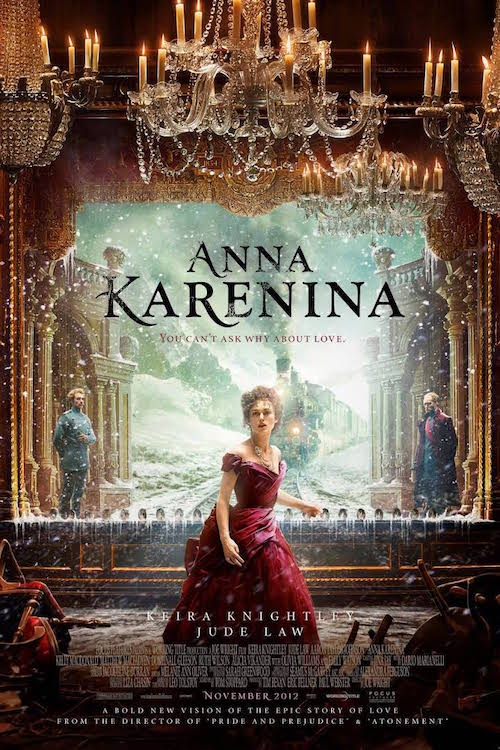Happy families are all alike; every unhappy family is unhappy in its own way
(Leo Tolstoy 1878)
Tolstoy’s Impact
Tolstoy is a philosopher/narrator within his novel Anna Karenina. He invites the reader to philosophize about happiness, as they read the doings, the thoughts and the feelings of his characters.
The Oblonsky family’s happiness is destroyed by adultery and financial problems; the Kareninas’ reputation is ruined by scandal; and even Levin’s happy marriage suffers from jealousy and ongoing arguments.
“Love at first sight” is still popular in romance novels of our own time, as it was in Tolstoy’s time. Vronsky and Anna are immediately attracted one to the other. However, the narrator, as well as utilising traditional symptoms—red lips and shining eyes—adds a mystical and philosophical dimension to the lovers’ first meeting.
Anna’s metaphorical role
As a destructive force within the novel, while Levin’s is a creative one.
Tolstoy means that for a family to be happy, several key aspects must be given, such as good health of all family members, acceptable financial security, and mutual affection. If there is a deficiency in any one or more of these key aspects, the family will be unhappy.
This perspective, in allotting such importance to the personal within the novel, helps explain Tolstoy’s impact on twentieth-century literature and thought.
However, is it true that there is a model for how to be a happy family, and the degree to which a family resembles that model will dictate the level of happiness the family will experience?
A Modern Interpretation
The term, the “Anna Karenina Principle”, was coined by Jared Diamond in his book, Guns, Germs and Steel, 1997. It states that a deficit in any one of a number of factors in any undertaking, will result in the failure of that undertaking. The reverse to this, is of a successful undertaking, in which every possible deficiency has been avoided.
This can be applied to families, to childhood experiences, and to stories about families and childhood. These are common topics in fiction and memoir for writers throughout the ages, as well as today. If the principle is correct, it would seem that unhappiness is more conducive as a theme for inspiration and for the creation of great literature than that of happiness,
The name of the principle, which is really a notion or a hypothesis, derives from Leo Tolstoy’s novel, Anna Karenina, 1878. At the beginning of the book we read, “All happy families are the same; every unhappy family is unhappy in its own way”.
Author Jared Diamond applied this logic to animal domestication (all undomesticated animals, such as zebras, cheetahs, giraffes and llamas were unsuitable for domestication in varying ways). The zebra was found to be unsuccessful, compared to the horse, as a family pet or equestrian subject, on many levels. (Wikipedia)
Pythagoreans, influenced by mathematics and mysticism, conjectured in a similar way: Men are good in but one way, but bad in many.
Anton Chekhov
My personal experience coincides with this hypothesis. So too, it seems, does the experience of another of Tolstoy’s contemporaries, Anton Chekhov, a major Russian short story writer and playwright (1860-1904). He received a religious education, so strict, that he turned away from religion as an adult: “And, do you know, when I think now of my childhood, it seems to me rather gloomy. I have no religion now.” Wikipedia.

Some experts consider Chekhov to be the father of the modern short story. His influence is seen in a large and diverse range of writers, including Flannery O’Conner, Somerset Maugham and Tennessee Williams.
Some of his best stories include, “The Huntsman”, “A Boring Story,” “The Lady with the Little Dog” and his own personal favorite, “The Student”. He was inspired, it seems, by his own unhappy childhood. The implication is that it is easier to write vividly about unhappiness than it is to write about the reverse: happy families. However, writing about unhappy families isn’t the same thing as writing tragedies in the classical context. For most modern stories, there is a glimmer of hope, or a satirical or ironical outlook on things.
An Australian Author
Closer to home, Christina Stead (1902-1983) wrote one of my all-time favourite family based novels, The Man who Loved Children. Stead was born and raised in Sydney, but lived much of her adult life in America. This novel, originally set in Sydney, was altered, for practical reasons, to suit American readers.
The Man Who Loved Children stands as Christina Stead’s masterwork. It tells the story of the Pollits, a highly dysfunctional family, torn apart by too many problems and differences. Sam Pollit is a naive, egotistical head of the household. The family has financial difficulties, not helped by the wife, Henny’s narcissistic spending, and Sam’s idealism. The terrible rift that opens up between the couple is a result of marital battles, too many children and the problems of blended family affections and alliances. The character of Sam is largely based on Stead’s own father, marine biologist, David Stead.
Unhappiness as a Theme
It would seem, then, that the best stories, be they fictional or memoirs, are inspired by unhappiness, rather than by happiness. At the same time, they are often relieved by a good dose of humour, or they are cloaked in satire or irony, with an ending that mixes both light and dark—allowing for hope to enter the mix—in order to lure the discerning reader.
Do you agree that great literature is rarely about happy families? Is it true that most famous writers have utilised their own unhappy childhoods as catalysts for their craft? Is writing creatively a way of exorcising our past trauma?

Leave a Reply
You must be logged in to post a comment.